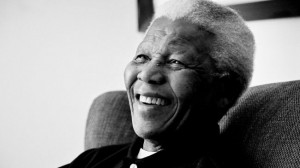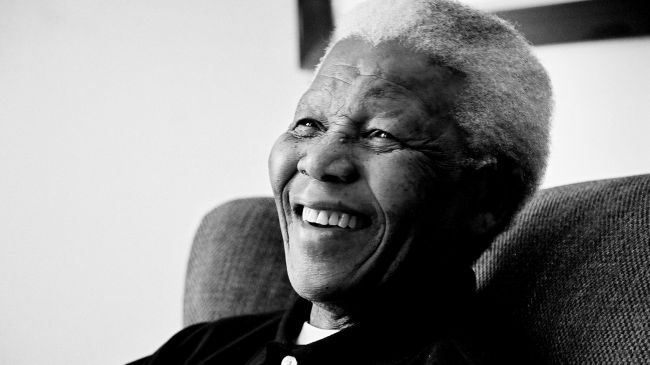 World leaders have paid glowing tribute to South Africa's anti-apartheid icon Nelson Mandela, who passed away at the age of 95 in Johannesburg on Thursday.
World leaders have paid glowing tribute to South Africa's anti-apartheid icon Nelson Mandela, who passed away at the age of 95 in Johannesburg on Thursday.South African President Jacob Zuma announced on Thursday night that Mandela had "departed," adding, "Our nation has lost its greatest son.�
Zuma said, "His tireless struggle for freedom earned him the respect of the world. His humility, his compassion and his humanity earned him their love.�
Iranian Foreign Minister Mohammad Javad Zarif paid tribute on his twitter page.
�We in Iran join the people of South Africa in mourning the death of Nelson Mandela who inspired humanity with his courage and compassion,� Zarid said.
US President Barak Obama expressed his sadness over the death of Mandela, calling him one of the most "influential, courageous and profoundly good human beings that any of us will share time with on this earth. He achieved more than could be expected of any man. Today he's gone home."
Obama added, "He no longer belongs to us; he belongs to the ages."
Former US President Bill Clinton mourned Mandela�s death, describing him as a "champion for human dignity and freedom."
"Today the world has lost one of its most important leaders and one of its finest human beings," Clinton said.
"History will remember Nelson Mandela as a champion for human dignity and freedom, for peace and reconciliation. We will remember him as a man of uncommon grace and compassion, for whom abandoning bitterness and embracing adversaries was not just a political strategy but a way of life," he added.
Brazilian President Dilma Rousseff called Mandela an example for those fighting for justice and peace. "The example of this great leader will guide all those who fight for social justice and peace in the world."
French Foreign Minister Laurent Fabius also paid his respects to Mandela, calling him a "a charismatic giant.�
"With Nelson Mandela, the father of South Africa, has died, the driving force for freedom and for reconciliation," Fabius said.
British Prime Minister David Cameron said, "A great light has gone out in the world. Nelson Mandela was a towering figure in our time; a legend in life and now in death -- a true global hero."
Australian Prime Minister Tony Abbott hailed Mandela as "a truly great man," saying, "Nelson Mandela was one of the great figures of Africa, arguably one of the great figures of the last century.�
"While the world may never see another Nelson Mandela, he has inspired countless men and women throughout the world to live more courageous and honest lives," Abbott added.
German Chancellor Angela Merkel said, "Nelson Mandela's shining example and his political legacy of non-violence and the condemnation of all forms of racism will continue to inspire people around the world for many years to come.�
Mexican President Enrique Pena Nieto said, "Humanity has lost a tireless champion of peace, liberty and equality."
Archbishop Desmond Tutu paid tribute to Mandela, calling him "an example of integrity, of reconciliation, of leadership in the service of the people."
"Certainly, he was exceptional, but the spirit of greatness that he personified resides in all of us," he added.
UN Secretary General Ban Ki-moon said, "Only because of such a great man like Nelson Mandela is it possible that particular people in Africa and elsewhere are able to enjoy freedom and human dignity. We have to learn the wisdom and determinations and commitment of Mr. Mandela to make this world better for all."
American civil rights leader Jesse Jackson said Mandela has left an "everlasting imprint."
"Nelson Mandela was a giant of immense and unwavering intellect, courage and moral authority. He chose reconciliation over retaliation. He challenged the course of history," Jackson added.
Mandela, who led South Africa's transition from white-minority rule in the 1990s after nearly three decades in prison, was one of the towering political figures of the 20th century.
He served as president of South Africa from 1994 to 1999, and was the first South African president to be elected in a fully representative democratic election.
After years of resistance against apartheid rule in South Africa, Mandela was arrested in 1962. He was sentenced to life in prison, where he served over 27 years. He spent many of those years on Robben Island.
Following his release from prison on February 11, 1990, Mandela led the African National Congress party in the negotiations that led to multi-racial democracy in 1994. As president, he frequently gave priority to reconciliation. He left office in 1999 after serving one term as president.
In South Africa, Mandela is often known as Madiba, his clan name, or as tata, which means father.
He received more than 250 awards over four decades, including the 1993 Nobel Peace Prize.
Seen as South Africa�s moral compass, the highly revered leader announced his retirement from public life in 2004, but continued to make a few public appearances.
By Press TV
The Iran Project is not responsible for the content of quoted articles











